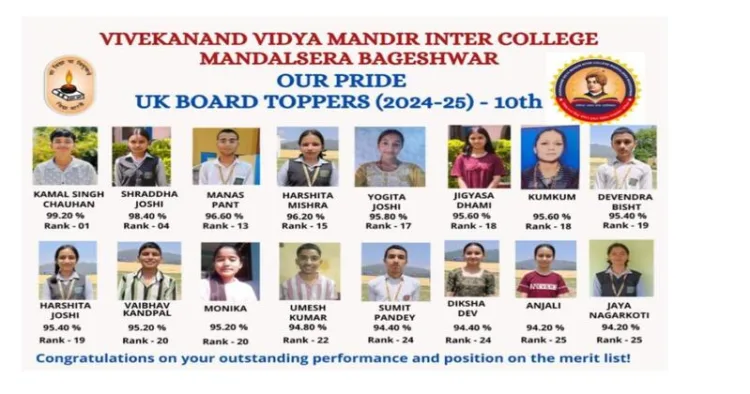
Vidya Bharati Schools Shine in Uttarakhand Board Exams
Kamal Singh Chauhan of Reema, Nakuru Patti, a remote village of the border district Bageshwar of Uttarakhand State & student of Vivekanand Inter college of the city, stood first in the Uttarakhand state board exams declared on Saturday. Vivekanand Inter college, a senior secondary school run by Vidya Bharati, the educational wing of the Rashtriya Swayamsevak Sangh (RSS), has once again proved strong academic performance in the Uttarakhand Board examinations, 16 of its students shines in the top 25 students ranking. Vivekanand Inter College Bageshwar and Saraswati Shishu Mandir Chouryasi, Bageshwar have emerged as top-performing institutions, with their students securing prominent positions in the merit lists for both the 10th and 12th standard exams.
This achievement underscores the academic rigour and dedication prevalent in Vidya Bharati schools across the country. With a vast network of over 40,000 schools across the nation, Vidya Bharati plays a significant role in India's educational landscape, reaching students in diverse regions, including remote and tribal areas. The organisation emphasises a holistic approach to education, aiming to in-still cultural values and a sense of national pride alongside academic learning.
The success of these schools in Uttarakhand reflects a consistent trend of Vidya Bharati institutions producing meritorious students in various state board examinations. This performance is often attributed to the strong foundation in core subjects, dedicated teachers, and a focus on character development that these schools emphasise.
Vidya Bharati's extensive network makes it one of the largest private educational organisations in India. Beyond formal schooling, it also runs cultural centres (Sanskar Kendras) and single-teacher (Ekal Vidyalay) schools, further contributing to educational outreach, particularly in underserved communities. The organisation's commitment extends to higher education, with many intermediate and degree colleges under its management.
However, the contributions of Vidya Bharati and its parent organisation, the RSS, to the education sector are not without scrutiny. Left-leaning, Islamic, and Christian organisations have often voiced criticisms about the ideology and curriculum followed in these schools. Concerns are often raised by them about the potential for the promotion of a particular religious or nationalist viewpoint, and the exclusion or misrepresentation of certain historical or social perspectives.
Critics argue that the emphasis on Hindu culture and nationalist ideology might come at the expense of a more inclusive and secular education but the same time they do not question Islamic teaching in Madrassa and Christianity in Convents. They express apprehension about the subtle infusion of a specific worldview that could potentially lead to social division and intolerance, but same logic is not applied to other schools. They allege content of some textbooks used in Vidya Bharati schools but do not question Quran & bible being taught, they often debate, with allegations of historical revisionism and the propagation of unscientific claims, though scientific temperament of Quran & Bible is known to the world.
Conversely, supporters of Vidya Bharati emphasise the organisation's commitment to providing quality education rooted in Indian values. They argue that instilling cultural awareness and patriotism in students is essential for national development. The organisation maintains that its schools are open to students from all religious backgrounds and that the focus is on holistic development, encompassing academic excellence and character building. They point to the academic achievements of their students as a testament to the quality of education provided.
The debate surrounding Vidya Bharati's role in education highlights the complex interplay between education, ideology, and national identity in India. As these institutions continue to expand their reach and influence, the discussions about their curriculum, pedagogical approaches, and underlying philosophy are likely to persist. The success of their students in board examinations undeniably showcases their academic standards, still the ideological implications of their educational model remain a subject of ongoing national discourse among the elite educationalists of the country.
First Saraswati Shishu Mandir school was established in year 1952 in Gorakhpur, Uttar Pradesh, Vidya Bharti was formerly founded in year 1977, while the country was seeing the worst impact of Emergency imposed by Congress Prime Minister of India Indira Gandhi.Vidya Bharti, the umbrella organisation for these schools, has a large alumni network. As of March 31, 2023, over 900,000 former students were registered with its alumni association. The alumni are well-placed in various fields, including, Doctors, Engineers, Advocates, Civil servants (including IAS and IPS officers), Entrepreneurs, Scientists (including those at ISRO and Bhabha Atomic Research Centre), Defence forces, Academics, Media, Sports, Arts and Culture etc. and in every occupation. Undermining contribution of RSS in education system, specially for the marginalised section of the society, is a clear case of hypocrisy for the intellectual community in the country.